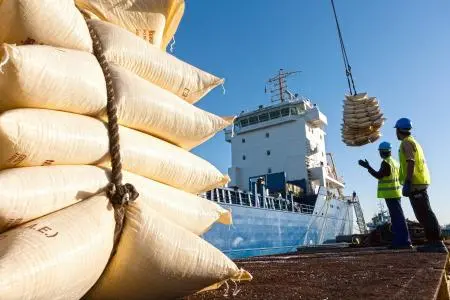PHOTO
Abu Dhabi, United Arab Emirates: Khalifa Port, one of the most modern, technologically advanced ports in the region, has surpassed 8.6 million continuous manpower hours since the last Lost Time Incident (LTI) in August 2015. Under the guidance of Abu Dhabi Ports, the master developer, operator and manager of commercial and community ports within the emirate of Abu Dhabi, Khalifa Port has become a beacon for health & safety best practice in the region.
Since the start of operations at Khalifa Port in 2012, Abu Dhabi Ports has targeted reducing lost time due to incidents at the facility. An LTI consists of a recordable incident in which an employee is not able to return to work on the day or shift following the incident that has occurred in the workplace.
Recognising the need to reduce the number of incidents and minimize lost productivity, Abu Dhabi Ports put in place measures that have resulted in the port recording 8,677,433 consecutive man-hours without incident.
Naser AlBusaeedi, Khalifa Port - Terminal Manager commented, saying: “Our achievement of 8 million man hours without an LTI needs to be credited to the commitment of the men and women who work at the port and adhere to our health and safety practices every day. At Khalifa Port, we strive to meet the highest standard of performance in all avenues and the safety of our employees is a top priority. We have worked hard to put measures in place to protect their welfare and are always looking to evaluate our operations and to introduce new safety procedures wherever possible.”
In 2017 alone, 42,544 hours have been dedicated to training staff to help keep them safe and the port fully operational – that’s over a thousand working weeks dedicated to health and safety initiatives.
Beyond Khalifa Port, Abu Dhabi Ports has delivered a similar reduction in LTIs across its operating units. Since 2014, Abu Dhabi Ports has reduced its overall LTI frequency rate by 86% from 1.43 to 0.19. The significant reduction in LTI Frequency Rate can be attributed to the 0 LTI Frequency Rate at Khalifa Port for two consecutive years as well as a number of measures that have been introduced by Abu Dhabi Ports in recent years including:
- Investing in technologies’ and engineering solutions to automate operations and reduce machinery and human interfaces
- Employee engagement schemes rewarding employees for proactively spotting potential LTIs before they ever occur
- The establishment a fully integrated safety culture leads to responsible business stewardship that motivates employees, improves performance and productivity and has a positive impact on our HSE performance results
- The introduction of an online portal for employees to suggest new safety measures
- A comprehensive training scheme and video tutorials rolled out across five languages that must be taken before work can begin
Mohammed Al Tamimi VP - Security & HSE, Ports at Abu Dhabi Ports commented: “We are incredibly proud of the results we have earned at Khalifa Port. We are proud to say that in nearly half the time we have been operating the Port, not a single LTI has disrupted the day-to-day operations. What we have put in place in Khalifa Port is also helping our other facilities to become leaner, safer and more productive. However, we must always be vigilant to ensure this record continues, and we must continually challenge ourselves to always to be mindful of potential risks.”
-Ends-
About Abu Dhabi Ports
Established in 2006, Abu Dhabi Ports, the master developer, operator and manager of commercial and community ports within the emirate of Abu Dhabi, in addition to the Port of Fujairah, as well as the trade and logistics hub, Khalifa Industrial Zone Abu Dhabi (KIZAD), in which Khalifa Port Free Trade Zone attracts direct investments to over 100 km2 of free zone opportunities, the largest in the Middle East region.
Inaugurated on Dec 12, 2012 by President of the UAE, HH Sheikh Khalifa bin Zayed Al Nahyan, Khalifa Port is the flagship port of Abu Dhabi Ports and is considered to be the first semi-automated container port in the region. Abu Dhabi Ports also owns 50% of Abu Dhabi Terminals, which operates and manages Khalifa Port Container Terminal with a full suite of logistics solutions to benefit trade partners and shipping lines. In addition to the current capacity of 2.5 million TEUs, the recent deal Abu Dhabi Ports signed with COSCO SHIPPING Ports Limited, which is expected to commence operations by 2019, will raise the annual capacity to 6 million TEUs in both container terminals.
Abu Dhabi Ports’ subsidiaries include Abu Dhabi Marine Services “SAFEEN”, providing a comprehensive range of marine, navigational and ancillary quayside services as well as VTS Services and fleet maintenance in a safe, secure and efficient manner; Maqta Gateway, which operates an innovative port community system, facilitating online information flow between all the port stakeholders and customers; and Abu Dhabi Cruise Terminal, the first permanent cruise terminal in the region. To meet the increasing demand of cruise liners and passengers, Sir Bani Yas Cruise Beach was developed, offerings cruise ship passengers a new beach destination with unmatched tourism experiences. Additionally, Abu Dhabi Ports also manages the Maritime Training Centre at Musaffah Port.
Follow us on twitter: @AbuDhabiPorts
© Press Release 2018



















